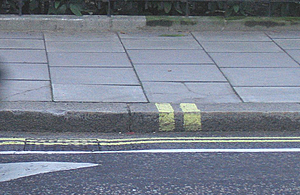Transport Secretary acts to make pavements safer for pedestrians
Government set to consult on proposals for a national pavement parking ban.

- pavements set to become safer for parents and disabled people thanks to proposals to crack down on pavement parking
- consultation will look at options including how a national pavement parking ban could work, taking into account necessary exceptions, and extended enforcement powers for local authorities
- latest in a series of improvements by the Transport Secretary to accelerate pace of change for a more accessible transport network
New proposals to tackle pavement parking and make streets safer for parents and disabled people were set out today by Transport Secretary Grant Shapps (12 March 2020).
The government is set to consult on proposals in the summer designed to improve the lives of people with mobility or sight impairments, as well as parents with prams who may be forced into the road to get around parked cars.
The 12-week consultation will include options such as allowing local authorities with civil parking enforcement powers to crack down on unnecessary obstruction of the pavement. Currently, outside London, only police have this power.
It will also consider how a nationwide ban on pavement parking enforced by local authorities might work, allowing for any necessary exceptions or designated spots for pavement parking where needed, and how a tailored approach may be required in rural and suburban areas which face very different challenges.
Transport Secretary Grant Shapps said:
Vehicles parked on the pavement can cause very real difficulties for many pedestrians.
That’s why I am taking action to make pavements safer and I will be launching a consultation to find a long-term solution for this complex issue.
We welcome the Transport Select Committee’s recent report and share their drive to tackle pavement parking and improve people’s daily lives.
In 2019 the Department for Transport concluded a review which looked at the problems caused by pavement parking, the effectiveness of legislation, and the case for reform.
It found that pavement parking was problematic for 95% of respondents who are visually impaired and 98% of wheelchair users.
The Transport Select Committee also recently conducted an inquiry into the issue, with the commitment to consult on proposals forming a key part of the government’s response to its findings.
Blanche Shackleton, head of policy, campaigns and public affairs at Guide Dogs said:
Pavement parking prevents people with sight loss from getting out and about safely, resulting in feelings of loneliness and isolation.
We look forward to working with the government to make this proposed law a reality.
Stephen Edwards, Director of Policy and Communications at Living Streets said:
Pavement parking forces people with wheelchairs, buggies and those living with sight loss into the road and into oncoming traffic and the most vulnerable pedestrians continue to be put at risk of injury and isolation every day that this dangerous act continues.
Clear pavements need clear laws, but currently regional differences cause confusion. We need a nationwide default ban, with the option to allow pavement parking in certain circumstances, as is currently available in London. This would be much simpler to enact and easier for everyone to understand.
The department is also looking at possible options to streamline and digitise the process used to create restrictions such as temporary road closures for roadworks, special events or permanent changes to speed limits and parking restrictions, known as ‘traffic regulation orders’.
Emma Free, 39, from Suffolk, a guide dog owner and longstanding campaigner on pavement parking said:
This announcement is a big weight off my shoulders. Cars parked on the pavement frequently force me into oncoming traffic and it makes me feel so disorientated and anxious.
Sometimes it just becomes too much and it makes me feel like I don’t want to go out at all, which defeats the purpose of having a wonderful guide dog. This announcement is fantastic news.
A TRO Discovery Project, carried out in partnership with GeoPlace, Ordnance Survey and the British Parking Association, completed last year which explored the process of making TROs, and how TRO data is made available and used across the country. A legislative review of the is now underway to find ways to improve it and make it easier for local authorities to implement restrictions.
Last month, the government launched an advertising campaign to improve the journeys of disabled passengers on public transport. ‘it’s everyone’s journey’ will raise awareness about the needs of disabled people when using public transport, particularly people with non-visible impairments, and will also prompt members of the public to think and consider how their behaviour might impact others.
For more information visit gov.uk/everyonesjourney, or follow @IEJGov on Twitter.
News desk enquiries
Media enquiries 0300 7777 878
Switchboard 0300 330 3000